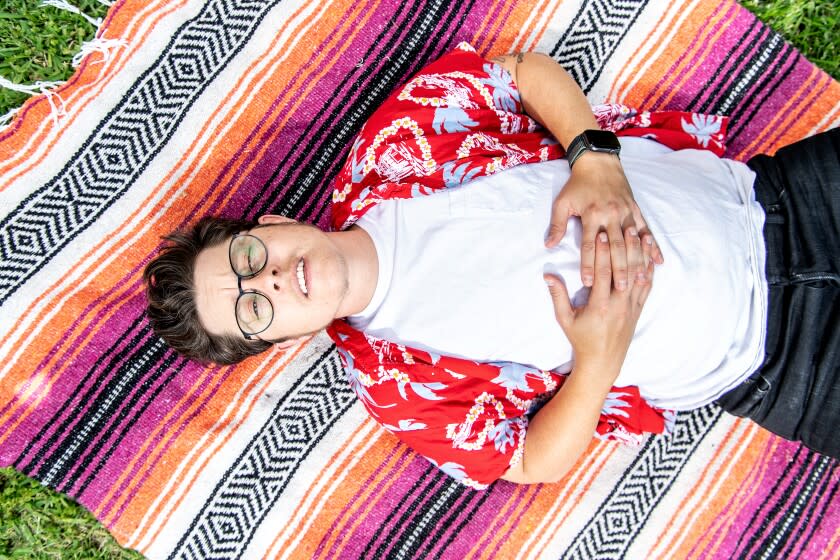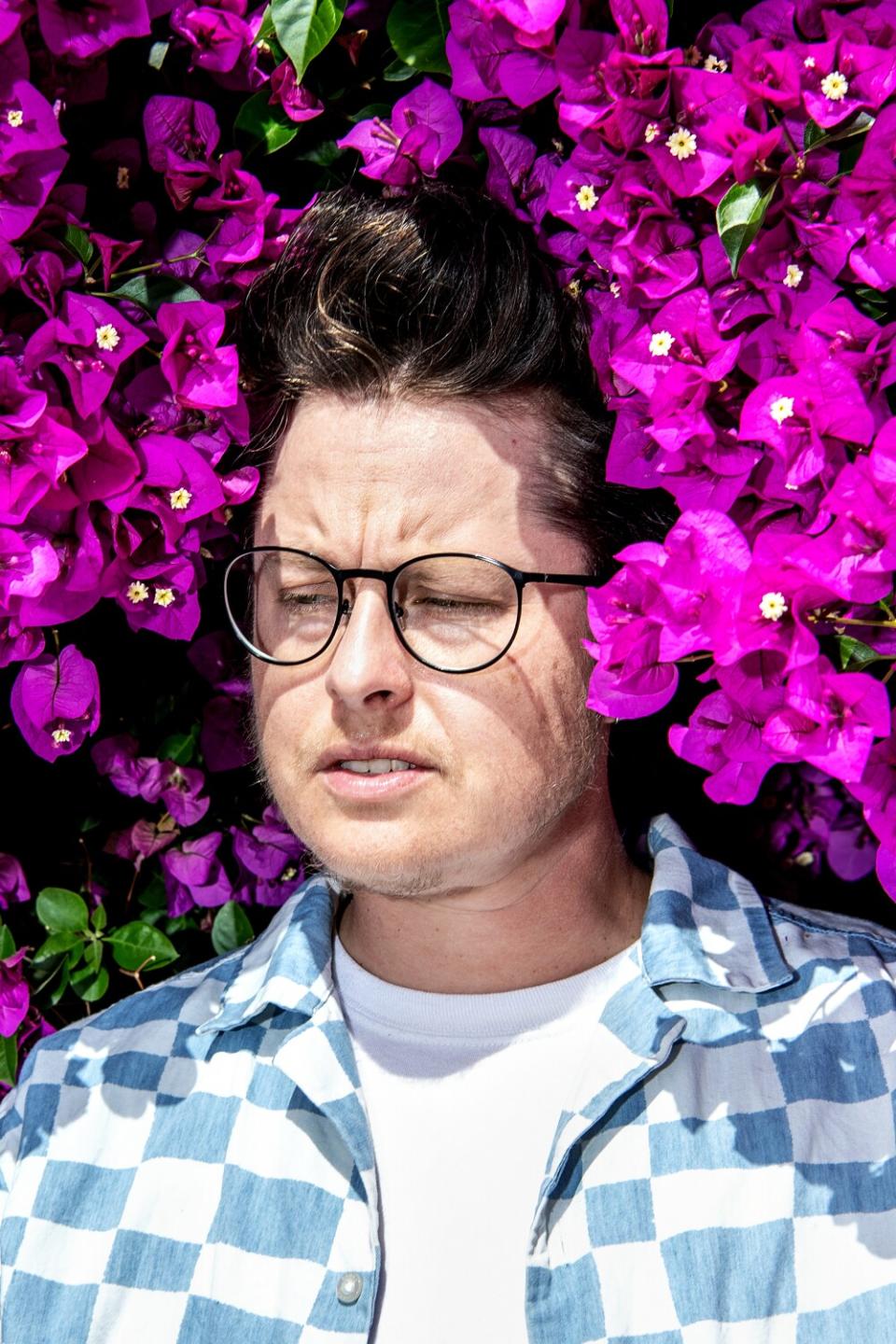River Butcher hasn't found a 'final form.' That no one will fuels his subversive comedy

- Oops!Something went wrong.Please try again later.
During his recent Comedy Central stand-up special, "A Different Kind of Dude," River Butcher expresses concern for “the people who hang rubber testicles from the backs of their trucks” — and blows at least one audience member’s mind in the process.
The comedian has plenty of questions in the bit, a hypothetical wellness check-in with the owner of a vehicle decorated by a dangling scrotum, because he's genuinely curious about what it all means.
“I just want to know what’s going on … because I see it all the time,” says Butcher during a recent video call from his home in Los Angeles. “I wish I could, but I don’t feel safe to actually walk up to somebody that’s got truck nuts and ask, ‘Hey, man, what’s up with your truck nuts?’ So I do it onstage.”
"A Different Kind of Dude" is marked by such nudges toward understanding, with the occasional misunderstanding skewered for good measure. It also sees Butcher, who will be making his second appearance during this year’s Netflix Is a Joke comedy festival on Saturday as part of “Stand Out: An LGBTQ+ Celebration,” relish moments of average dude-ness.
Known for his casual approach to incisive personal observations, Butcher’s stand-up special and more recent live shows are a sort of reintroduction for the comic, who has always incorporated jokes about all aspects of his identity into his sets. Since audiences saw him perform before the pandemic, Butcher has transitioned and announced his new name.
He addresses his transition succinctly about two minutes into "A Different Kind of Dude," partly so he would not be asked about it.
“It was hard to get onstage and just not say anything about the fact that … people know me as a different name and a different guy,” says Butcher. “Someone’s going to call me something whether I speak to it or not … [so] I just wanted to feel as though I was participating in my own identity, as opposed to just receiving labels from people.”

Butcher isn't the same nonbinary trans guy now that he was when he recorded the stand-up special in July, either. In addition to any visible differences, at that time, Butcher used different pronouns, and a screen projection backdrop in the special displays a different name.
After all, Butcher was not interested in waiting until he reached some sort of “final form” in his gender before going onstage again. For one thing, he doesn’t even believe such a thing exists, for anyone. For another, he says, “I felt like I was denying myself my art and creativity if I did that.”
The choice between going onstage and waiting in the wings is an experience that echoes one of Butcher’s earliest professional opportunities.
A native of Akron, Ohio, Butcher grew up an only child living with his mother, who introduced him to stand-up comedy on television. Among the comics he remembers watching at that time are Rosie O’Donnell, Ellen DeGeneres, Brett Butler, Judy Tenuta and Laura Kightlinger.
Even at a young age, he understood stand-up comedy was for adults, so he would repeat jokes he heard in these shows to his teachers to try to score laughs. But it wasn’t until years later that he realized performance and comedy were things he wanted to — and could — pursue.
“I didn't even know what an open mic was until I was in college,” says Butcher. “I had no idea what that was and never knew anybody that did it.”
Although it was not necessarily his first paid gig, Butcher considers one of his earliest “professional” experiences to be the 20-minute set he performed at a club in a Chicago suburb when most of his prior experience was doing three minutes at open mics.
“I think I had eight minutes [of material] at the time,” says Butcher. “I went and I did 20 minutes, and it felt like the longest time of my entire life.”
But for him, doing comedy professionally doesn’t mean waiting until you have perfected 20 minutes of jokes before doing a 20-minute set. It’s about making the leap when the opportunity arises. It was better to do “A Different Kind of Dude” “imperfectly,” in other words, than not to do it at all.
Though he dispenses with the subject of his transition swiftly in the special, Butcher is plenty familiar with addressing gender onstage. Talking about his own played a key role in the way his understanding and experience of his identity changed over time .
“My experience of gender is so different now because that misgendering just doesn’t happen like it did [before],” says Butcher, who recognizes now being ignored for his gender as a privilege. “That has been, honestly, so freeing. I didn’t really know how much that was affecting me on a daily basis to be sort of just inundated with this invasive experience.”
Being affected by other people’s perception of his gender for so long is part of the reason Butcher continues to address the subject onstage. His hope is that raising people’s consciousness will allow others “to walk down the street and experience their life without constant invasion of their space.”

This commitment to consciousness-raising, Butcher explains, has also moved him to shift the focus of his comedy away from representation and visibility toward material support — such as housing, healthcare and education — for people who are vulnerable and without protections.
“We’ve got to keep expressing ourselves and working towards protecting each other,” says Butcher. “I don’t think that my stand-up does that, but I think that the collection of people who come to see my stand-up, being in a space together, is what can grow that.”
And, despite a political climate that has become increasingly hostile toward the LGBTQ community in recent months, with trans people a particular target of both conservative lawmakers and transphobic jokesters, Butcher doesn’t often name "homophobes" or "right-wingers" or other targets of his humor explicitly.
Instead, Butcher allows identity to become the lens through which his jokes are told, rather than the topic of the comedy per se . The setup for Butcher’s truck nuts joke, for example, is that people should leave trans kids alone and redirect the energy they expend on pushing anti-trans policies into concern for people who put gendered anatomical decorations on their cars. The punchline is the thing he doesn’t get, not the person who does the thing he doesn’t get, and it’s that subversive pivot that makes the bit both powerful and entertaining.
Whether the joke earns him the approval of the widest possible audience is another matter — and one Butcher has come to reconsider. Earlier in his career, he says, the prevailing sentiment was that a comic needed to be funny for everyone, with jokes that could play anywhere. It’s an axiom he no longer believes.
“If that was true, then people wouldn't be making jokes that were harmful to people,” he says. “Because it doesn't play everywhere, actually. If you came in and did transphobic jokes at an audience at my show, you wouldn't get laughs. It's a misconception that just because someone has a large platform, they are universal.”
This story originally appeared in Los Angeles Times.

